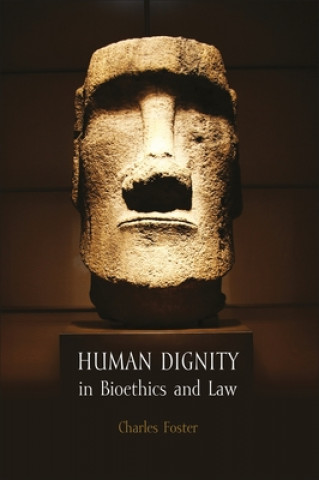
Consegna
Guida all'acquisto





Non ti piace? Non importa! Puoi restituircelo entro 30 giorni
 Buono sconto
Di qualsiasi valore
Buono sconto
Di qualsiasi valore
Non puoi sbagliarti con un buono regalo. Con il buono regalo, il destinatario può scegliere qualsiasi prodotto della nostra offerta.
Human Dignity in Bioethics and Law
 Inglese
Inglese
 233 b
233 b
30 giorni per il reso
Potrebbe interessarti anche


Dignity is often denounced as hopelessly amorphous or incurably theological: as feel-good philosophical window-dressing, or as the name given to whatever principles give you the answer that you think is right. This is wrong, says Charles Foster: dignity is not only an essential principle in bioethics and law; it is really the only principle. In this ambitious, paradigm-shattering but highly readable book, he argues that dignity is the only sustainable Theory of Everything in bioethics. For most problems in contemporary bioethics, existing principles such as autonomy, beneficence, non-maleficence, justice and professional probity can do a reasonably workmanlike job if they are all allowed to contribute appropriately. But these are second order principles, each of which traces its origins back to dignity. And when one gets to the frontiers of bioethics (such as human enhancement), dignity is the only conceivable language with which to describe and analyse the strange conceptual creatures found there. Drawing on clinical, anthropological, philosophical and legal insights, Foster provides a new lexicon and grammar of that language which is essential reading for anyone wanting to travel in the outlandish territories of bioethics, and strongly recommended for anyone wanting to travel comfortably anywhere in bioethics or medical law. 'The Beauchamp-Childress medical ethic paradigm has dominated medical ethics for four decades. It never worked very well but it was teachable, flexible, and transparent. Foster gives us a better paradigm - teachable, transparent, and plausible. Better yet a paradigm - human dignity - that is likely to make us better people, better physicians, and better care givers. Foster refocuses us on what is truly common among us as a basis for dealing with the central ethical issues of health care, patient care, and death care. This is a new reconceiving of medical ethics and everyone who cares about these matters needs to get comfortable with thinking in this refreshing new way.' Stefan Baumrin, Professor of Philosophy, City University of New York, Graduate Center, and Professor of Medical Education, Mount Sinai School of Medicine, New York 'Wide-ranging and erudite, Foster's book 'Takes Dignity Seriously'. Dignity is shown to be a core value in law and bioethics, foundational, a lens through which to project hard cases. It is a rare book which finds a common thread to questions as disparate as euthanasia, sado-masochism, enhancement, cloning, abortion, refusals of medical treatment by children, and numerous other areas of controversy. But this is achieved thoughtfully, entertainingly, and persuasively, in the process throwing new light on many leading cases in the UK , USA, Germany and Israel. It is bound to provoke debate, even controversy. It will be a great assignment for university seminars.' Michael Freeman FBA, Professor of English Law, UCL 'I never had any respect for the concept of human dignity. I thought it was a motherhood concept, empty of real practical import. But Foster converted me. Foster, uniquely, goes the right way round, identifying real human problems and trying to solve them, rather than starting with philosophical problems and theories and creating a concept of dignity that fits them. This is a book for people and progress. It's the best book on dignity I know.' Julian Savulescu, Uehiro Chair of Practical Ethics, University of Oxford 'This book is the perfect antidote to the unseemly polemics that have dominated recent debates about the concept of dignity in bioethics. Foster takes the notion of dignity seriously and argues that it is indispensible to deliberations about pressing issues in bioethics such as informed consent, abortion, euthanasia, cloning, enhancement, and the use of body parts. He argues that the concept is more fundamental than our concepts of autonomy, rights, and justice, and requires us to think hard about more substantive issues such as what it means to be human and what it means to flourish as a human being. He presents an excellent overview of the current literature on dignity in bioethics, usefully collecting together in one place sources from philosophy, clinical bioethics, law, international conventions, and the blogosphere. While scholarly, it is accessibly written in lucid and lively prose. Human Dignity in Bioethics and Law is a substantial contribution that moves the debate on this contentious but important issue up to the next level.' Daniel P Sulmasy, Kilbride-Clinton Professor of Medicine and Ethics, University of Chicago 'In Human Dignity in Bioethics and Law Charles Foster sets out an argument that is provocative in its simplicity: dignity is the 'bioethical theory of everything', the value by which all bioethical disputes should be adjudicated. Drawing extensively from both philosophical and legal debates, this book makes an important contribution to a central issue facing societies in the 21st Century. It deserves to be highly influential for academics and practitioners alike.' Suzy Killmister, Massey University 'Charles Foster's Human Dignity in Bioethics and Law sets out clearly the state of the question regarding the basis of personal dignity. It also advances an original argument to defend a substantive content for the concept of dignity. It is worthy of study and re-study.' Patrick Lee, John N and Jamie D McAleer Professor of Bioethics. Director, Institute of Bioethics, Franciscan University of Steubenville 'Charles Foster has written a remarkably thoughtful and eloquent book, arguing persuasively that 'human dignity'-not 'autonomy' or any other narrow principle-is the indispensable lens through which to view the perplexing moral landscape of contemporary bioethics. I learned much from this comprehensive, open-minded, and deeply humane volume.' Adam Schulman, co-editor of Human Dignity and Bioethics: Essays Commissioned by the President's Council on Bioethics 'This is a spirited study, engagingly written, deeply immersed in the relevant literature, and rich in insight. A valuable contribution to the study of human dignity from a bioethical perspective.' George Kateb, William Nelson Cromwell Professor of Politics, Emeritus, Princeton University 'Charles Foster's analysis and defence of the concept of dignity as fundamental in medical law and ethics is to be welcomed warmly by scholars and students of the field. It is written with his characteristic verve and panache, yet is at the same time thoughtful and scholarly. We are all in his debt for his analysis of the philosophical, historical, sociological and legal accounts of dignity. And even if you do not accept all his normative conclusions, his demonstrations of dignity-based reasoning in law and ethics are genuinely illuminating and helpful.' Richard Ashcroft, Professor of Bioethics, Queen Mary College, London 'Respecting patients' dignity is one of the most commonly used ideas in bioethics: whether in professional guidelines, in legal judgments or in casual conversation. And yet philosophers, on the whole, don't like it. Many argue that it is too vague and that it can be replaced by other, better concepts, such as autonomy. Indeed this was my position. Foster, however, swims strongly against this philosophical tide and has forced me to rethink. Those who want to sideline dignity will need to read this book and engage with Foster's arguments. Those more open to the importance of dignity will enjoy Foster's company as he informs and amuses the reader with bizarre legal cases and forceful analyses.' Tony Hope, Professor of Medical Ethics, University of Oxford 'Dignity has long been considered the most protean of ethical concepts-shapeshifting, frustratingly elusive, impossible to pin down-but in this invigorating book, Charles Foster argues powerfully for dignity to be reinstated at the heart of thinking about ethics in medical practice. Dignity is, in Foster's hands, a richly empirical concept concerning the embodied and socially embedded moral lives of real people and what it is that makes it possible for them to 'flourish': the normative force of dignity being provided by empirical evidence about the interpersonal conditions under which humans either do or don't thrive. Through an analysis of real and hypothetical cases, Foster argues that ethics should be concerned with the encouragement (the maximisation even) of such relationships. Foster believes that the normative force of dignity 'is best appreciated in the wild places', illustrating this through a number of worked examples concerning 'places' such as reproductive choice and 'enhancement'. But ultimately, perhaps, it is in the interactions between human beings in the quotidian settings of health care practice, discussed in earlier chapters, in which dignity is shown at its most powerful as a way of knowing the difference between ethical and unethical practices and where dignity is or is close to being, as Foster argues-at the heart of everything.' Michael Parker, Professor of Bioethics, University of Oxford 'This brilliant, erudite, and yet common-sensical book is written by a moral philosopher and lawyer who reasonably hates Kant, sees clearly the limits of autonomy in describing who we are, and defends ably the dignity of the embodied, relational beings we are. I certainly agree that dignity has a substantial meaning that can be deployed by real people making challenging decisions, and I now know a lot more about why that is so.' Peter Lawler, Dana Professor of Government, Berry College, Georgia and author of Modern and American Dignity
Informazioni sul libro
 Inglese
Inglese
Categorie


 Contatto
Contatto Come acquistare
Come acquistare

































